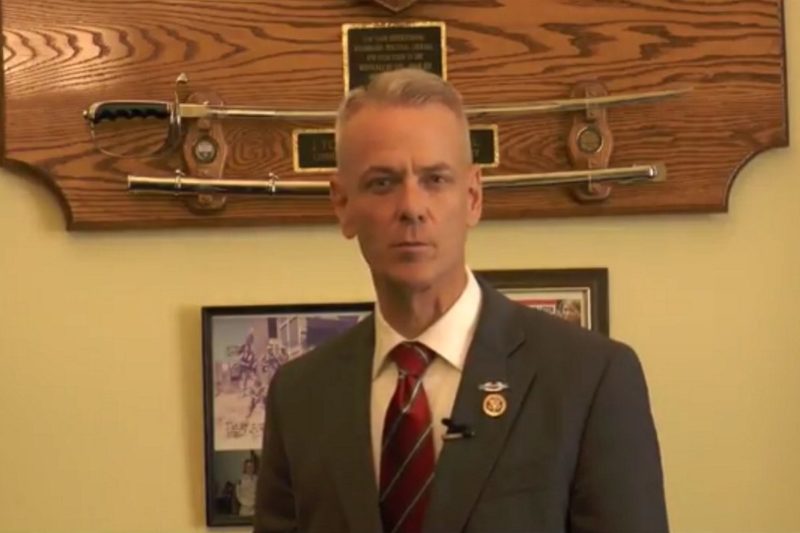Congressional GOP Pursues Codified Discrimination Against Range of Identities
The Russell Amendment follows in the tradition of measures that purport to protect religious freedom at the expense of marginalized groups, while actually codifying the imposition of religious beliefs on others.

Congressional Republican-led efforts to undo President Obama’s anti-discrimination executive order to protect LGBTQ federal contractors would reverse protections for even more groups of people than first thought.
The discriminatory Russell Amendment would allow federal contractors claiming a religious affiliation to target some 28 million workers on the basis of gender identity, sexual orientation, religious affiliation, and reproductive health-care decisions.
But Rep. Steve Russell (R-OK) crafted broad language that covers recipients of not only every federal contract but also subcontracts, grants, cooperative agreements, and purchase orders—resulting in an amendment that could apply to many more workers than the initial 28 million estimate. Progressive groups contend that the Russell Amendment would allow religiously affiliated hospitals and universities, for instance, to wield the same discrimination over thousands of additional employees.
The Russell Amendment follows in the tradition of measures that purport to protect religious freedom at the expense of marginalized groups, while actually codifying the imposition of religious beliefs on others and giving the courts potential justification to rule against legal challenges to discriminatory actions. A federal court in August cited the genesis of such measures, the Religious Freedom Restoration Act (RFRA), in a ruling against a transgender worker fired at the behest of her employer’s religious beliefs.
RFRA, a federal law dating back to 1993, served as the model for Indiana Gov. Mike Pence, the GOP vice-presidential nominee, in carrying out his commitment to discriminate against the state’s LGBTQ community.
So-called religious freedom laws also allow the imposition of religious beliefs when it comes to reproductive rights. The 2014 decision in Burwell v. Hobby Lobby allows some employers to ignore provisions in the Affordable Care Act that require insurance companies to cover contraceptives.
Such measures are inconsistent with the views held by 72 percent of Americans, who support nondiscrimination protections for LGBTQ people in employment, housing, and public accommodations, according to the nonpartisan Public Religion Research Institute. Strong majorities hold up among Democrats and Republicans and among Catholics and mainline Protestants.
Wide-Ranging Discrimination Possible
The sheer scope of the Russell Amendment troubles the progressive groups fighting against it.
“It’s almost like Hobby Lobby on steroids,” Sejal Singh, communications and campaigns manager for LGBT Progress, a project of the Center for American Progress (CAP), told Rewire in an interview.
The Russell Amendment represents a significant threat to reproductive justice, Singh said. “It could even apply to firing someone who has premarital sex,” she said. “We see those effects very disproportionately impacting LGBTQ people and women but also want to point to the fact that under this provision, an employer could refuse to interview people who are Muslim or Jewish or who [otherwise] practice a faith that is different from that of the employer.”
Singh’s CAP colleague Laura Durso, senior director of the LGBT Research and Communications Project, participated in a call last week with Sen. Richard Blumenthal (D-CT) and representatives from NARAL Pro-Choice America, the American Civil Liberties Union, the Human Rights Campaign, Planned Parenthood Federation of America, and Americans United for Separation of Church and State.
NARAL Pro-Choice America President Ilyse Hogue said she found it “really telling” that debate on the Russell Amendment is escalating while the impending presidential election has spurred a national conversation on “bias against huge numbers of Americans.”
Congressional Republicans, she charged, “are working overtime to distance themselves from Donald Trump’s blatant misogyny, his regressive views on women as equals, and his promise to punish women who have abortions, when they themselves are demonstrating that exact same worldview, when they attach provisions like this to critical legislation.”
Mounting Tensions at Critical Point
The largely partisan battle began in May. Russell rallied fellow Republicans on a House committee to include his amendment in the National Defense Authorization Act (NDAA), even though the discrimination he outlined would apply well beyond the defense sphere. Republicans led a largely party-line vote to pass NDAA later that month.
Democrats subsequently sought to nullify the language on the House floor, leading chants of “Shame! Shame! Shame!” as GOP leaders undermined their initially successful vote. A week later, Democrats again threw the floor into disarray over another failed attempt to counter the amendment.
The Senate’s version of NDAA lacks a similar provision. Still, the “Big Four” leaders of the House and Senate Armed Services committees are reportedly deadlocked along party lines. Though Senate Armed Services Chair John McCain (R-AZ) has a track record of opposing so-called religious freedom measures, he has yet to comment publicly, and his office would not do so while negotiations remain ongoing.
Senate Democrats have become increasingly vocal in their attacks on the Russell Amendment. The same day Blumenthal partnered with progressive groups on the call, he led more than 40 of his colleagues in urging the “Big Four” to drop what he called “sweeping taxpayer-funded discrimination.”
Blumenthal did not rule out a Democratic-led filibuster of NDAA over the Russell Amendment. White House aides, meanwhile, repeated Obama’s broad veto threat from May, promising progressive groups that Obama would ax the bill if it includes the discriminatory language.

